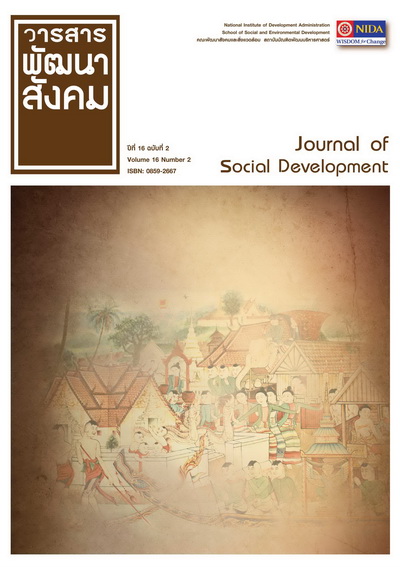ภาคปฏิบัติของวาทกรรมการพัฒนาชุมชนเกาะบูโหลนดอน
Main Article Content
Abstract
บทคัดย่อ
บทความนี้มีวัตถุประสงค์เพื่อศึกษาถึงวาทกรรมการพัฒนาในพื้นที่ชุมชนเกาะบูโหลนดอน ตำบลปากน้ำ อำเภอละงู จังหวัดสตูล โดยใช้วิธีวิจัยเชิงคุณภาพ ด้วยการสังเกต และสัมภาษณ์แบบเจาะลึกจากผู้ให้ข้อมูลสำคัญ 11 คน วิเคราะห์ข้อมูลด้วยการจำแนกหมวดหมู่ตามประเด็น ตีความ สร้างข้อสรุป และนำเสนอด้วยการพรรณนาเชิงวิเคราะห์ ผลการวิจัยพบว่า ภาคปฏิบัติการของวาทกรรมอำนาจตั้งอยู่บนพื้นฐานของหลักเหตุผลที่สร้างความชอบธรรมให้กับการปฏิบัติการของรัฐว่า เป็นสิทธิที่รัฐจะเข้าไปจัดการ และกำหนดกฎเกณฑ์ขึ้นซึ่งประชาชนต้องให้การยอมรับและปฏิบัติตามกฎเกณฑ์ดังกล่าว ภาคปฏิบัติการของวาทกรรมการพัฒนาได้ทำหน้าที่ผ่านตัวแทนของสถาบัน ได้แก่ องค์การบริหารส่วนตำบลปากน้ำ กรมชลประทาน กระทรวงพลังงาน โดยที่โครงการพัฒนาบางโครงการ ชาวบ้านไม่มีโอกาสได้มีส่วนร่วมในการออกแรงสร้าง หรือร่วมแสดงความคิดเห็น จึงส่งผลให้โครงการที่เข้ามาพัฒนาชุมชนเกาะบูโหลนดอน บางโครงการ ขาดการประสานงานอย่างต่อเนื่องจากคนในชุมชน การติดตราสัญลักษณ์แสดงให้เห็นถึงความเป็นเจ้าของโครงการ โดยสถาบันหรือหน่วยงานที่เข้ามารณรงค์เผยแพร่การพัฒนา ดังนั้นในทางปฏิบัติสถาบันจึงไม่ได้ทำหน้าที่พัฒนาในความหมายที่เราเข้าใจกัน แต่ทำหน้าที่ควบคุมให้อยู่ในวินัย เพื่อให้ชุมชนที่เป็นเป้าหมายของการพัฒนาเข้าสังกัดเป็นส่วนหนึ่งของสถาบัน และปฏิบัติตามมาตรฐานที่สถาบันกำหนดให้
คำสำคัญ: วาทกรรมการพัฒนา การพัฒนาชุมชน ชุมชนบูโหลนดอน
Abstract
The objective of this study was to investigate the development discourse in Ko Bulon Don Community, Tambon Pak Nam, La-ngu District, Satun Province. The data of this qualitative study were collected through observations and in-depth interviews with 11 key informants, and the data were then classified into categories, decoded, interpreted, concluded, and presented as analytical descriptions. The results revealed that the discursive practice of power was based on reasons for righteousness of state practice that it is the state’s right to manage and set rules for people to accept and comply with. The practice in development discourse has functioned through representatives of institutes, which were Pak Nam Tambon Administrative Organization, the Royal Irrigation Department, and Ministry of Energy. Nevertheless, villagers did not have opportunity to participate in building or expressing their opinions on some community development projects. As a result, some development projects for Ko Bulon Don lacked continuous coordination from people in the community. Displays of logos of the institutes or agencies that campaigned or publicized the development projects indicated their ownership of the projects. Therefore, in practice, the institutes and agencies did not actually function in the development according to the meaning that people understood, but these institutes and agencies functioned to control the projects so that the community that was the target of the development became part of the institutes and complied with the standards set by the institutes.
Keywords: Development Discourse; Community Development; Bulon Don Community


